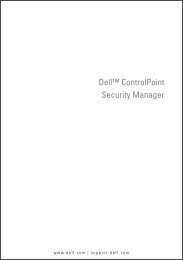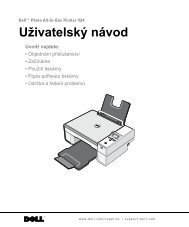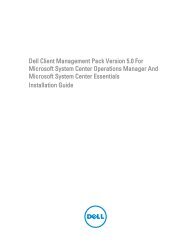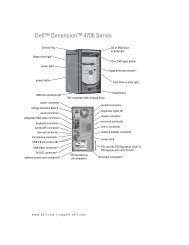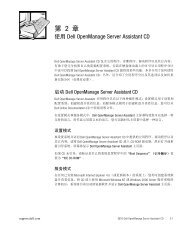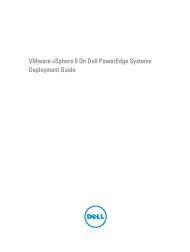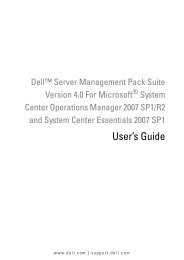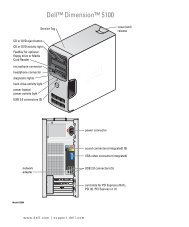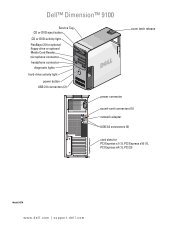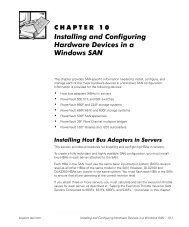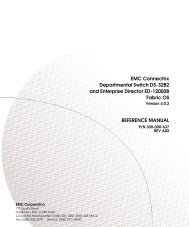Dell OpenManage Server Administrator Version 7.1 ... - Dell Support
Dell OpenManage Server Administrator Version 7.1 ... - Dell Support
Dell OpenManage Server Administrator Version 7.1 ... - Dell Support
You also want an ePaper? Increase the reach of your titles
YUMPU automatically turns print PDFs into web optimized ePapers that Google loves.
1. Log in as root to the system running the supported operating system where you want to install the managed<br />
system components.<br />
2. Insert the <strong>Dell</strong> Systems Management Tools and Documentation DVD into the DVD drive.<br />
3. Mount the DVD, if required.<br />
4. Navigate to /SYSMGMT/srvadmin/linux/supportscripts directory. Run the srvadmininstall.sh<br />
shell script, which performs an express installation.<br />
sh srvadmin-install.sh --express<br />
or<br />
sh srvadmin-install.sh -x<br />
The setup program installs the following managed system software features:<br />
– <strong>Server</strong> <strong>Administrator</strong> Web <strong>Server</strong><br />
– <strong>Server</strong> Instrumentation<br />
– Storage Management<br />
– Remote Access Controller<br />
Remote enablement is not installed and <strong>Server</strong> <strong>Administrator</strong> services do not start automatically.<br />
NOTE: The 32-bit srvadmin-cm RPM is not installed when <strong>OpenManage</strong> is installed on a 64-bit operating system. If<br />
required, install the srvadmin-cm package from the appropriate subfolders under SYSMGMT/srvadmin/linux/<br />
RPMS/supportRPMS/srvadmin from the <strong>Dell</strong> Systems Management Tools and Documentation DVD. Inventory<br />
Collector utility carried as part of srvadmin-cm rpm feeds software inventory data to <strong>Dell</strong> Management Station<br />
applications like ITA.<br />
5. Start the <strong>Server</strong> <strong>Administrator</strong> services after the installation using the srvadmin-services.sh script by using the sh<br />
srvadmin-services start command.<br />
Component Specific Install Using RPM Commands<br />
The RPMs specific to a particular <strong>OpenManage</strong> component are grouped together. To facilitate an RPM-based<br />
installation, install the RPMs from the following directories:<br />
• SYSMGMT/srvadmin/linux/custom//Remote-Enablement/< arch><br />
• SYSMGMT/srvadmin/linux/custom//SA-Web<strong>Server</strong>/<br />
• SYSMGMT/srvadmin/linux/custom//<strong>Server</strong>-Instrumentation/<br />
• SYSMGMT/srvadmin/linux/custom//add-RAC4/<br />
• SYSMGMT/srvadmin/linux/custom//add-RAC5/<br />
• SYSMGMT/srvadmin/linux/custom//add-StorageManagement/< arch><br />
• SYSMGMT/srvadmin/linux/custom//add-iDRAC/<br />
Where is the supported operating system and is 32-bit (i386) or 64-bit (x86_64).<br />
NOTE: In case of SUSE Linux Enterprise <strong>Server</strong> version 10 and 11: 32-bit <strong>Dell</strong> <strong>OpenManage</strong> rpm packages are<br />
provided for upgrade from the previous 32-bit installs only. If you do not have an existing installation, then you<br />
cannot install a 32-bit version of the software. You must install operating system specific rpms from the 64-bit<br />
directory.<br />
For example, if you are running Red Hat Enterprise Linux version 5, you can customize the installation by adding the<br />
RPMs from the following directories:<br />
48



